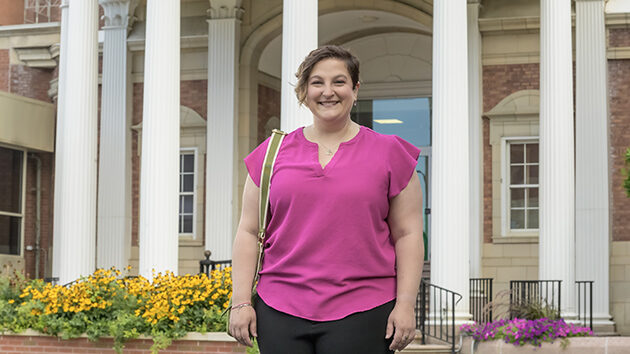System Offers Full Range of Breast Care for all Generations

When Giulia Pezzulo found a lump in her breast in January 2022, she immediately thought “cancer.” She had previous experience with finding lumps during self-exams—a fast-growing fibroadenoma was removed in 2014. This time a series of tests confirmed it was breast cancer. She was 31 years old.
She met with Lynn Choi, MD, FACS, breast surgeon and director of Albany Medical Center’s Breast Care Center, and her team. Together they came up with a treatment plan, beginning with chemotherapy.
With advances in breast cancer treatment, including targeted chemotherapies and immunotherapy, which are available in the Albany Med Health System, it’s more important than ever to get screened.
“The beauty of a mammogram is you can detect and diagnose cancer at very early stages, significantly increasing the chances of survival,” said Dr. Choi.
Before she could start treatment, since Pezzulo is of child-bearing age, she needed to decide about potential future children. She underwent fertility treatment and had a successful egg retrieval. Soon after, she began chemo. At her second session, Pezzulo made the decision to shave her head instead of watching her hair fall out in clumps.
“It was actually very empowering,” she said. She dressed up and wore a pink wig to chemo for the rest of the summer. “If I am going to be in a horrible situation, I might as well have fun. I also wanted to start conversations with others in treatment, and try to help them feel confident in their own skin while we all went through our journeys.”
After chemotherapy, Pezzulo had a unilateral mastectomy and axillary lymph node dissection, a surgical procedure that removes lymph nodes from the armpit to check for cancer spread. Doctors found seven of those nodes tested positive for cancer. This finding allowed her team to further tailor the follow-up radiation.
“Each patient is unique, and we are committed to providing quality, compassionate individualized breast health care for the best possible outcomes,” said Dr. Choi. She connected Pezzulo to local support organizations that provided gift cards for dinner and baskets of comfort items and invited her to Siena College’s Pink Zone Basketball Game, where she met dozens of other survivors.
Today Pezzulo is healthy. She had reconstruction and revision surgery this year, takes several medications as part of her treatment, and has screenings every six months, alternating between MRIs and mammograms.
“Having screening and diagnostic services available in convenient, easily accessible locations helps save lives,” said Rakel Astorga, MD, breast surgeon at Columbia Memorial Health’s Center for Breast Health. “Digital 3D mammography and the latest screening technology provide sharper, more detailed images of breast tissue, which is key in early detection.”
The Albany Med Health System provides comprehensive breast health services from the Hudson Valley to the Canadian border, at all four hospital campuses and in clinics throughout the region.
System patients have access to multidisciplinary teams of physicians, new screening and treatment options, information on clinical trials, genetic counseling, and patient-centered services including psychosocial support.
“When a patient is facing a breast cancer diagnosis, it is critical that they feel confident in the care they receive and supported throughout their treatment,” said Patricia Rae Kennedy, MD, FACS. “It is so important for patients to feel comfortable in asking questions and to make sure they understand their options—to know they are not alone in this.”
Dr. Kennedy, director of the Saratoga Hospital Center for Breast Care, who specializes in breast cancer surgery and hidden scar procedure, emphasized the need for patients to feel well-informed and empowered from imaging to diagnosis to treatment and survivorship.
According to John P. Stoutenburg, MD, medical director of the C.R. Wood Cancer Center at Glens Falls Hospital, “Early detection and treatment methods have significantly increased breast cancer survival rates. Access to quality breast health and cancer care close to home is important for patients in our region.”